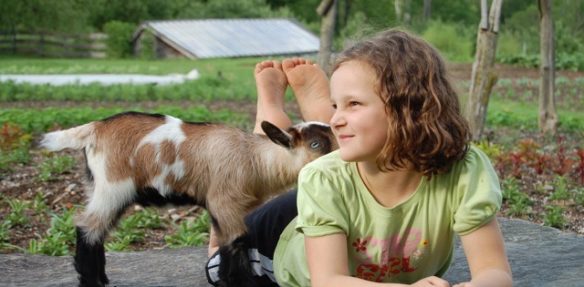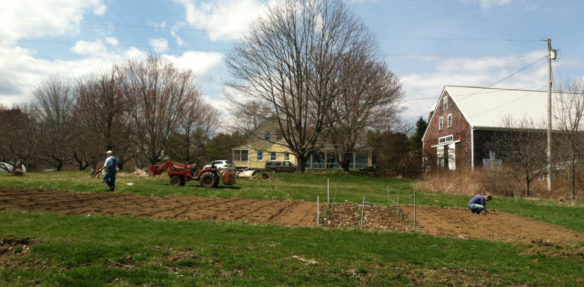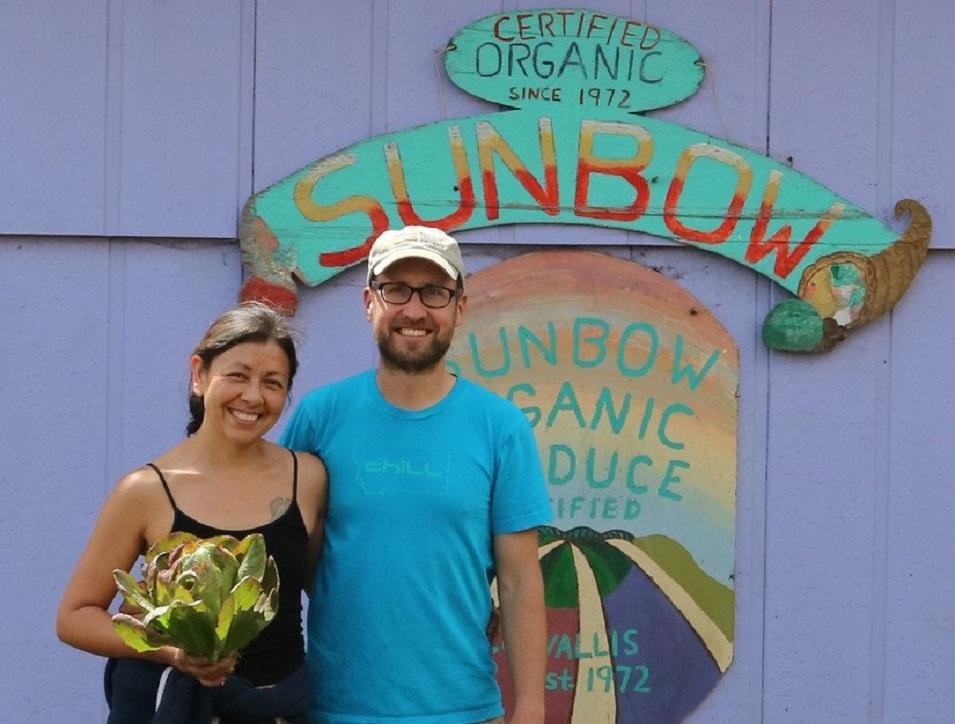
“What we know is that each situation seems to require flexibility, creativity, and patience, all of which is difficult in a very fast moving market, and with an eager younger generation of farmers usually not having the capital to buy necessary parcels as they become available.”
– Harry MacCormack, landowner
In The Beginning:
Harry MacCormack has owned 15 acres of farmland on the edge of Corvallis, Oregon since 1972. He started his farm growing vegetables, fruits, beans, and grains, and also started an on-farm composting business. His commitment to using sustainable methods allowed him to be an instrumental force driving the national organics movement as co-founder and first executive director of Oregon Tilth.
Harry and his partner Cheri Clark have farmed the 15-acre property full time, year round since 2005. Harry’s two adult children live off site and are not interested in farming, which led Harry to consider innovative possibilities for passing his land on to the next generation.
Nate Johnson and Yadira Ruiz met on Harry’s farm as new farmers in Harry’s apprenticeship program. The two were interested in farming full time and starting their own farm business, but without savings or the ability to qualify for a traditional bank mortgage loan, they could not afford to buy Harry’s property or any other property in the area. Fortuitously, Harry’s need for successor farm managers matched the young farmers’ need for land. This mutual need led to the creation of an LLC-based farm succession arrangement designed to benefit everyone. Under this arrangement, Harry and Cheri can pass the legal ownership of the farm to their non-farming children, Yadira and Nate can have access to farmland and can own and manage a farm produce business, and Harry and Cheri can continue their farming and compost business at the level they desire.
The LLC Arrangement
Harry had originally placed his land in a living trust, for which Harry is a trustee. However, when Harry, Cheri, Yadira, and Nate started discussing the farm’s future, Harry created Sunbow Farm LLC and made the living trust the sole member of the LLC. Harry is the director of the LLC, and Harry, Cheri, Yadira, Nate, and Harry’s two adult children are all managers of the LLC (but are not LLC members and therefore do not own a membership interest in the LLC). Additionally, Yadira and Nate (as individuals) lease the farmland from the LLC, as discussed below, for $1 per year.
Harry still owns and runs his own compost business (which also pays $1 per year rent to the LLC), but Harry and Cheri transferred the farm’s produce business (Sunbow Produce) to Yadira and Nate in 2015. Yadira and Nate own the produce business separate and apart from the LLC. This arrangement allowed Nate and Yadira to start farming without needing to take out a loan or to spend a great deal of money on infrastructure or propagation equipment.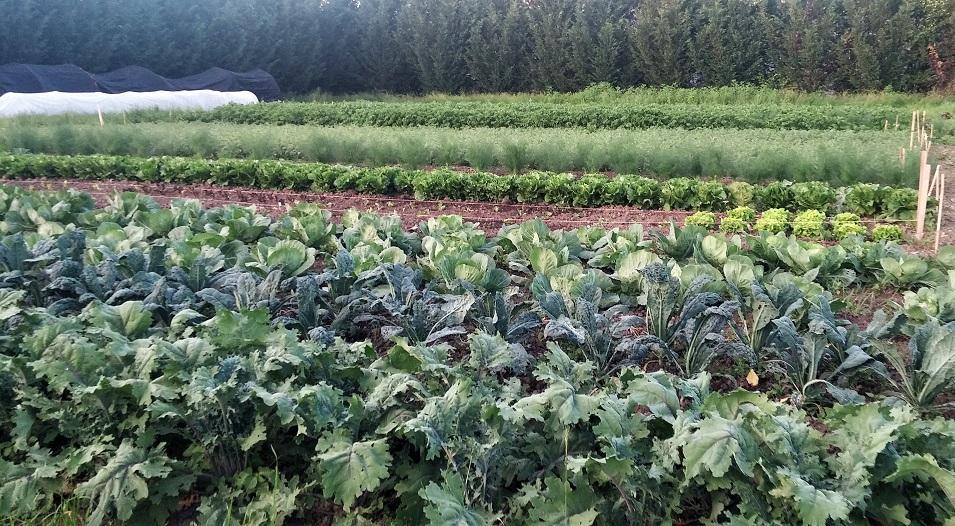
The LLC is also structured so that Harry’s children’s membership interests in the LLC are inheritable and will pass to his children’s heirs (if any) in the future. The living trust contains specific succession of ownership within Harry’s family. It also contains a “never to be sold" property clause. The LLC operating agreement contains language of succession that make Nate and Yadira responsible along with the trustees for succession once Nate and Yadira are ready for the farm to be passed on to another generation.
The Lease Arrangement
When Yadira was farming at Sunbow as an apprentice, she paid rent to Harry to live on site. However, when Harry and Cheri transferred ownership of Sunbow Produce to Yadira and Nate, Yadira stopped paying rent to live on site. Instead, the produce company she co-owns with Nate (as a legal partnership) now pays the agricultural property taxes. Yadira and Nate (as individuals) lease the land from the LLC for an annual fee of $1. Notably, no portion of the produce business profits are paid to the LLC; rather, Nate and Yadira are permitted to reinvest those profits back into their business and the farm infrastructure (as agreed upon with Harry and the other LLC members).
The lease is an “evergreen lease” (also known as a rolling lease), meaning that it automatically renews every 5 years for up to 99 years. Essentially, the lease provides Yadira and Nate the right to continue farming so long as certain stipulations are met. For example, the two must pay rent, maintain the property and structures, and continue to farm organically. The parties agreed that the lease terms may be renegotiated as needed.
The parties are currently in year three of their five-year leasing arrangement.
Other Aspects Of The Parties’ Succession Arrangement
Harry and Cheri still live on the property in the farmhouse. The parties’ agreement allows Nate and Yadira the option of moving into the farmhouse after the deaths of Harry and Cheri. The arrangement also allows Nate and Yadira to have a lifetime right to live on the property so long as it is being farmed and Nate and Yadira manage the farm operation.
The parties all recognize that Harry’s two adult children may decide to go in a different direction and one day relinquish their management roles in the LLC. All parties have discussions frequently and check in with each other regarding their current plans and thinking.
With respect to additional expenses that arise, the group meets quarterly to discuss and parse out expenditures based on what feels fair and equitable to all those involved. For example, the group decided they wanted to redo the gravel in the driveway to make it more usable for customers picking up at the farm. Harry and Cheri decided that they would split the cost and the work of redoing the driveway with Nate and Yadira.
Harry says that “those kinds of decisions are ongoing,” and that Nate and Yadira are also responsible under the LLC operating agreement for maintaining or upgrading existing buildings, like the five greenhouses, three wells, pumps, etc. Also, Harry and Cheri have chosen to split the electric bill with Nate and Yadira. Tractors are shared between Harry’s compost business and Sunbow Produce, and Harry says that when he is “ready to quit doing the compost business, that too will be passed on to Nate and Yadira if they want.”
The parties’ legal arrangement also emphasizes Harry’s role as a mentor. Before all the paperwork was signed, Harry was willing to gradually phase out of the produce business for the six months prior to signing. Harry makes himself available to talk and to offer advice and guidance. “Succession within a family or with carefully chosen successors involves trust,” Harry says. “Trust is not covered by the best of legal language.”
Finally, stewardship of the land plays a key role in the parties’ arrangement. The lease contains a provision granting authority to Nate and Yadira to work with the National Resources Conservation Service (NRCS) to improve the land and enter into conservation agreements with the agency.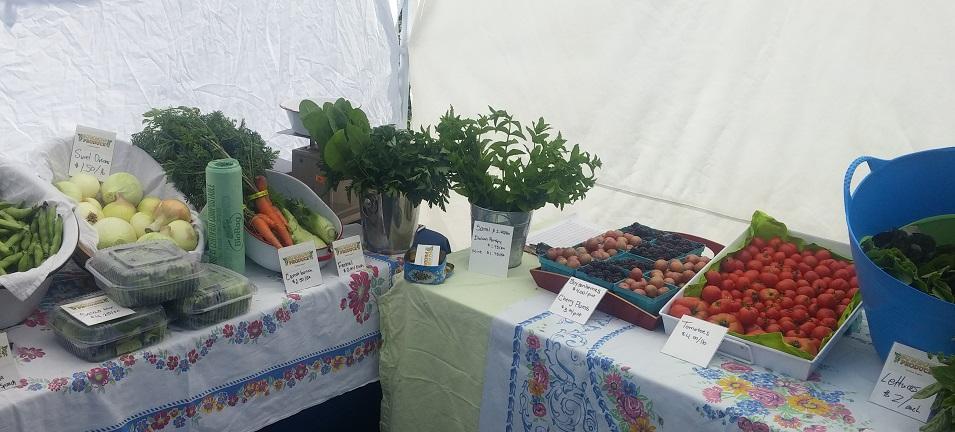
Pros and Cons Of The Arrangement
Both Yadira and Nate agree that a major benefit they receive under the parties’ arrangement is stepping into a successful 40-year organic farming business. Harry gave them his customer list, as opposed to selling it as a separate asset. Yadira and Nate benefited from the instant access to a customer base and enjoy the strong reputation Harry and Cheri have cultivated over the years. The produce business operates in a manner similar to a CSA, although the farm does not offer shares and it is not a box program. Instead, a market list is sent out weekly all year round, and customers have the opportunity to shop from that list, order online, and select pick up or delivery options. No minimum monetary commitment is required per season. Many pick up their purchases at the farm, but Yadira and Nate will deliver for purchases exceeding $10.00.
Yadira and Nate admit that no arrangement is without a downside, admitting with a laugh that “existing infrastructure is a blessing and a curse.” While they benefit from not needing to purchase or build infrastructure, most of what presently exists is old and needs updating. For example, electrical, plumbing, and structural issues abound and Yadira and Nate are responsible for the upkeep and maintenance of the farm pursuant to the terms of their lease. This works with their existing goals of streamlining the space. Unlike some land owners, Harry has been open and willing to allow Nate and Yadira to make the changes they need; a green light from him is necessary to keep moving forward. Future projects include reworking the retail space called the “market room,” the back corner of the property used for a pop-up farm stand, and installing a walk-in cooler to accommodate wholesale orders and long-term storage crops.
Yadira says that there was “a lot of gut-checking that happened” when this opportunity arose. Nate agrees and says that they engaged in many reality checks, running “what if” scenarios. The two agree that it is important to enter these arrangements with “eyes wide open.” While it is impossible to foresee all the consequences of every decision and the two recognize that despite the best intentions, all might not go according to plan, they do not regret their decision. Even if the arrangement does not ultimately work out, Nate says, “some of what we’re paying for with the sweat equity is our own education. And that is worth more. I take that with me. I would leave a farmer.”
Yadira also recommends that people considering similar arrangements “look at the benefits that aren’t necessarily quantifiable,” such as the mentorship she is able to receive from Harry. She goes on, “We live in a society where everything takes a backseat to the commercial value. Of course, it’s a business and you have to be aware of that and you have to approach it by making sure you look out for your own interests, but you also need to make sure you’re generous and looking out for each other.” Nate adds, “We’re part of a continuous stewardship of this land. The emphasis is more on the development of all the players and the place.”
Yadira recognizes that these kinds of arrangements are not necessarily for everyone, and Nate cautions new farmers in similar situations that “there is a kind of big-heartedness that you need to walk into this . . . and you can’t be naïve.”
